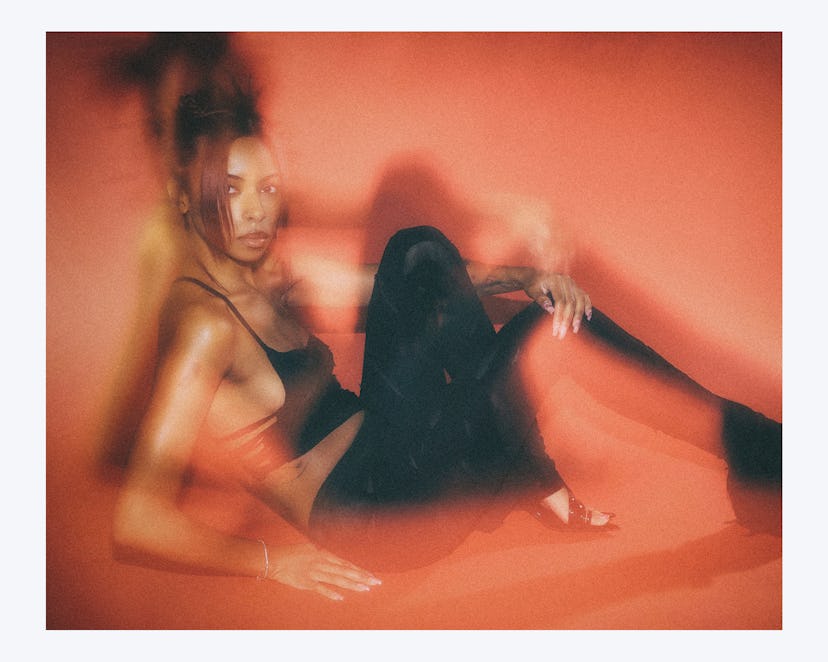Ravyn Lenae Takes Her Time
The musician—who just released her debut album, Hypnos—discusses her Chicago roots and bucking the pressures imposed upon young woman artists.

Ravyn Lenae signed a deal with Atlantic Records when she was 16 and went on tour with the rapper Noname while she was still in high school. By 2018, when Lenae turned 19, she had already released three EPs. And as her career as a singer of slinky, experimental R&B songs started to take shape, a prevailing “wise-beyond-her-years” narrative developed around it. Well, she’s a teenager, it seemed to say. (“It’s hard to believe that someone so young could be bursting with so much talent,” one outlet wrote; she “radiates a maturity beyond her age,” said another.)
“Yeah… yes,” says Lenae, now 23, laughing with recognition as I say this. It’s a Thursday afternoon, the eve of her album release. In several hours, she’ll get together with a bunch of friends and family in Los Angeles, where she lives, to celebrate Hypnos—her full-length debut, and her first project of any sort in four years. So I ask: Did she take that time as a form of resistance against assumptions about her age?
Actually, there were moments when she feared waiting. “Especially as a young woman, there’s this pressure to keep up with the times,” she says. Maybe she wasn’t sufficiently established as an artist to take so much time to put out more music. People might forget about her; fans might not care anymore. But mostly, she just wanted to get the record right, however long it took. “I can make songs all day. It’s not about making enough songs. It’s about making songs that feel like now and that feel like me,” she says.
The result is Hypnos, which came out on May 20. It’s a 16-track “journey through where my brain has been,” Lenae says, delving sonically and lyrically into explorations of womanhood, romance, sensuality, and sexuality. She oversaw all the production, describing her role as something like a curator: She brought in a mix of new and familiar collaborators like the producers Monte Booker, Steve Lacy, and Kaytranada; and the musicians Smino, Mereba, and Foushée. “Every time, she’s been at a new level,” says Smino, who first met Lenae in 2015 at Chicago’s Classick Studios. “Her whole process is like, this is going to be my best shit.” Lenae “knows when she wants something,” he says—whether that’s a particular drum track or a feature on a song—and makes it happen.
Lenae grew up in Chicago, in a home filled with the classics of ’90s and ’00s R&B and hip-hop: Erykah Badu, Destiny’s Child, Goapele, Outkast, Busta Rhymes, India.Arie, Pharrell. “I think I grew up with this sharp ear, in a way, for good music,” she says. She has two younger sisters. “There aren’t that many men in my family, so a lot of feminine energy,” she says. (That’s her grandmother’s voice at the end of the Hypnos track “Inside Out.”) But she was the only one who wanted to make music herself; her family members primarily pursued what she describes as “corporate careers.” (Her grandfather, once a fairly well-known doo-wop singer in Panama, excepted.)
Lenae released her first EP, Moon Shoes, in 2016. Her rise coincided with a wave of emerging Chicago artists: Noname, Mick Jenkins, Jamila Woods, and Saba were releasing their first records; Chance the Rapper was reaching an apex with Coloring Book. There was a lot of cross-pollination, too, with many artists popping up to feature on others’ songs.
“If you know Classick Studios, the energy within those walls is just all family,” Smino says. (When I emailed Smino’s manager to ask whether he would be interested in talking with me for this story, he replied within minutes: “Definitely. Ravyn is family.” The rapper echoed this: “That’s my little sis to this day.”)
Lenae started working on Hypnos in 2019, not long after she finished touring her third EP, Crush. She knew she wanted to write a full-length album, but beyond that, the project was pretty nebulous. She traveled continuously between Chicago and Los Angeles, meeting different producers and exploring different sounds. And she was listening to a lot of Black women artists for inspiration—Brandy most of all. She wrote “Venom,” the second track, with Booker in Chicago, and its energy—“fresh, exciting, mysterious, and a little weird and eerie,” she says—helped crystallize the project.
But the pandemic forced her to swerve. “I think everyone can relate to feeling very lost and almost unsure of what your purpose is in the world, and if your job is important and shit like that. It took me a while to gear back up,” she says. In August 2020, she relocated to Los Angeles. Many of her musician friends from Chicago, including Smino and Booker, had already moved there, and the city’s warm weather and easy access to nature started to look more appealing as the pandemic wore on. She describes the songs that emerged from lockdown, like “Inside Out,” as more inward-looking than some of the pre-pandemic music.
By the end of 2021, Lenae had figured out the final track list for Hypnos. Six months later (and just three days before we talk), she finished mastering the songs. She says it doesn’t quite feel real yet. But she’s clear about one thing: “I just want people to really understand why it took me this long,” she says. “It’s a project of growth.”